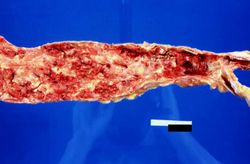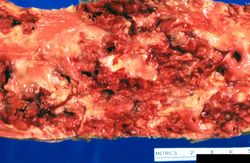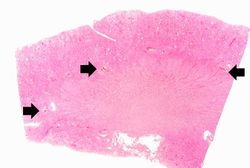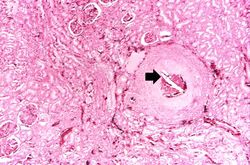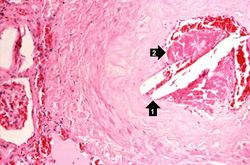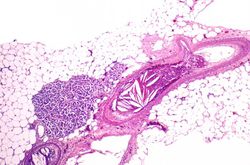Difference between revisions of "IPLab:Lab 4:Atheromatous Emboli"
Seung Park (talk | contribs) |
Seung Park (talk | contribs) |
||
| Line 21: | Line 21: | ||
* <spoiler text="What happens when atherosclerotic material embolizes?">When the atherosclerotic plaque ruptures collagen, cholesterol esters and necrotic material are exposed to the blood stream. This initiates thrombus formation. So, in addition to the cholesterol embolizing to distal vessels, thrombosis is also initiated and can obstruct vessels.</spoiler> | * <spoiler text="What happens when atherosclerotic material embolizes?">When the atherosclerotic plaque ruptures collagen, cholesterol esters and necrotic material are exposed to the blood stream. This initiates thrombus formation. So, in addition to the cholesterol embolizing to distal vessels, thrombosis is also initiated and can obstruct vessels.</spoiler> | ||
* <spoiler text="What other types of material can embolize and cause clinical problems?">Probably 99% of all emboli are thromboemboli. Other materials that can embolize are: fragments of bone or bone marrow, fat, tumor cells, foreign bodies such as bullets, and bubbles of air or nitrogen.</spoiler> | * <spoiler text="What other types of material can embolize and cause clinical problems?">Probably 99% of all emboli are thromboemboli. Other materials that can embolize are: fragments of bone or bone marrow, fat, tumor cells, foreign bodies such as bullets, and bubbles of air or nitrogen.</spoiler> | ||
| + | |||
| + | == Additional Resources == | ||
| + | === Reference === | ||
| + | * [http://emedicine.medscape.com/article/1950759-overview eMedicine Medical Library: Noncoronary Atherosclerosis] | ||
| + | * [http://emedicine.medscape.com/article/460428-overview eMedicine Medical Library: Cholesterol Embolism] | ||
| + | * [http://www.merckmanuals.com/professional/hematology_and_oncology/thrombotic_disorders/overview_of_thrombotic_disorders.html Merck Manual: Thrombotic Disorders] | ||
| + | |||
| + | === Journal Articles === | ||
| + | * Scolari F, Ravani P. [http://www.ncbi.nlm.nih.gov/pubmed/20381857 Atheroembolic renal disease]. ''Lancet'' 2010 May 8;375(9726):1650-60. | ||
| + | |||
| + | === Images === | ||
| + | * [http://peir.path.uab.edu/library/index.php?/tags/52-kidney PEIR Digital Library: Kidney Images] | ||
| + | * [http://library.med.utah.edu/WebPath/ATHHTML/ATHIDX.html WebPath: Atherosclerosis and Thrombosis] | ||
| + | * [http://library.med.utah.edu/WebPath/CVHTML/CVIDX.html WebPath: Cardiovascular Pathology] | ||
| + | * [http://library.med.utah.edu/WebPath/RENAHTML/RENALIDX.html WebPath: Renal Pathology] | ||
| + | |||
| + | == Related IPLab Cases == | ||
| + | * [[IPLab:Lab 1:Kidney Infarction|Lab 1: Kidney: Infarction (Coagulative Necrosis)]] | ||
{{IPLab 4}} | {{IPLab 4}} | ||
[[Category: IPLab:Lab 4]] | [[Category: IPLab:Lab 4]] | ||
Revision as of 03:34, 22 August 2013
Contents
Clinical Summary[edit]
This 71-year-old male was admitted to the hospital with dry gangrene of the left great toe. Subsequently, he was found to have a poorly differentiated adenocarcinoma of the left upper lobe of the lung. He developed a perforation of a duodenal ulcer with generalized peritonitis and died five days after admission.
Autopsy Findings[edit]
Gross examination of the aorta revealed severe atherosclerosis with extensive mural thrombus formation. Recent infarcts were noted in the spleen and in the left kidney. An old posterior myocardial infarct was noted. The left iliac artery also appeared to be almost totally occluded. A whitish-tan tumor was noted in the apical portion of the left upper lobe of the lung with metastases in the carinal and hilar lymph nodes.
Images[edit]
Study Questions[edit]
Additional Resources[edit]
Reference[edit]
- eMedicine Medical Library: Noncoronary Atherosclerosis
- eMedicine Medical Library: Cholesterol Embolism
- Merck Manual: Thrombotic Disorders
Journal Articles[edit]
- Scolari F, Ravani P. Atheroembolic renal disease. Lancet 2010 May 8;375(9726):1650-60.
Images[edit]
- PEIR Digital Library: Kidney Images
- WebPath: Atherosclerosis and Thrombosis
- WebPath: Cardiovascular Pathology
- WebPath: Renal Pathology
Related IPLab Cases[edit]
| |||||
Mural thrombosis is the formation of multiple thrombi along an injured endocardial wall.
A thrombus is a solid mass resulting from the aggregation of blood constituents within the vascular system.
Plural of embolus. An embolus is something that blocks the blood flow in a blood vessel. It may be a gas bubble, a blood clot, a fat globule, a mass of bacteria, or other foreign body. It usually forms somewhere else and travels through the circulatory system until it gets stuck.
